Up Close and Personal
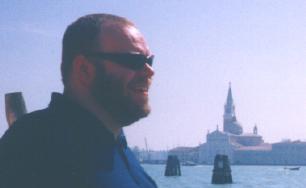 This page has been the most difficult part of writing my personal
homepage. How do you present yourself without showing off too much or
making a fool of yourself? On the other hand, isn't this what having
a personal homepage is all about?
This page has been the most difficult part of writing my personal
homepage. How do you present yourself without showing off too much or
making a fool of yourself? On the other hand, isn't this what having
a personal homepage is all about?
(In case you're wondering, the picture was not taken
in Bochum but in 2003 on a beautiful day trip to Venice.)
![]()

BIT ROT ALERT: Due to taking a new job at PENN
this part of my homepage needs a serious update.
![]()
About My Current Job
My current job is officially the position of a 'resaerch
assiociate' in the group of
Prof. Dominik Marx at the
Lehrstuhl für Theoretische Chemie
of the
Ruhr-Universität Bochum .
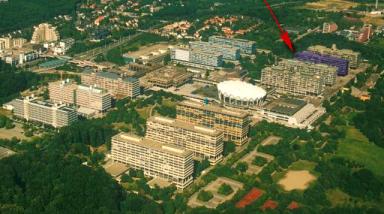 This is the kind of position usually
offered to postdocs while they are struggling to make a name for
themselves and figure out a way to get a real position,
e.g. as a professor or something equivalent. You have to help with
running the department, do some teaching and in exchange you get (a
bit of) money and you may use university and departmental facilities
for your research to further the progress of science.
This is the kind of position usually
offered to postdocs while they are struggling to make a name for
themselves and figure out a way to get a real position,
e.g. as a professor or something equivalent. You have to help with
running the department, do some teaching and in exchange you get (a
bit of) money and you may use university and departmental facilities
for your research to further the progress of science.
In my case, the situation it is a little bit different. For starters, i don't plan to become a professor ;-). Furthermore, i don't have to do any research (to my own annoyance, i only get to do research if i neglect my other duties or work day and night). Instead my main task is to plan, acquire, organize, configure and run the quite substantial (as of spring 2004: >150 nodes, about 1 TeraFLOP/s, about 200GB RAM, about 10TB disk) computer facilities of our department. Of course, this can be only done in close cooperation and with the help of my colleagues, and although the computing center provides the bulk of our network infrastructure, we have many liberties and as such are quite independent and thus very flexible. The high point (so far) was the purchase of our current main local computer resource, a 76-node dual AMD-Athlon Cluster with a high-speed interconnect.
Since i started here in Bochum (spring 2000), i had the nice opportunity to build a full fledged 'computing center' basically from scratch, with desktop workstations, SMP compute servers, smaller and large parallel clusters, mail server, firewall, web/ftp-server and so on. Also, due to the need of maximizing the cpu-power yield, we are running mostly (and very successfully) linux on PC hardware. This needs constant (re-)evaluation of available hardware and a careful search for optimal and reliable hard- and software combinations, and - since the amount of manpower for maintainance for all those machines is very much limited - many administrative tasks had to be (partially) automated (i.e. a ton of customized, robust and simple programs or scripts had to be written). So in a way you could call me a righteous BOFH and occasionally you may even find me in search for a big enough clue-by-four.
Another facet of my current job is to help adapting, extending and optimizing software for our platforms, mainly our bread-and-butter application CPMD (for which i also provide some user support over the CPMD-mailing list and am currently trying to assemble an on-line tutorial), and to generally figure out stuff. Some results of that are visible on the web, e.g. the framework for building our (partially) multi-language department homepage with a consistent design and automatic pdf file generation (without the overhead of a content management system), or a tutorial for creating high quality visualizations from (ab initio) molecular dynamics or quantum chemical data, or a simple but efficient book search engine.
To fulfil my teaching duties (see above), i have been made the formal head and one of the chief architects of our 'Virtual Laboratory'. Virtual in this case does not mean it is a non-existent laboratory, but it stands for doing chemistry with a computer instead of real chemicals (thank god) and using electron structure methods and molecular dynamics simulations. In other words it is the place where we do practical exercises with our students. Similar to the computer equipment, the virtual laboratory had to be build from scratch and is now a room full of Linux PCs and collection of exercises on our web-server (sorry, not (yet) avaiable from the outside). Although the bulk of the exercises are in german a sample exercise has been made available and translated to english.
Working in and for the 'Virtual Lab' is another high point of
my current job
(and a quite successful one, too).
There is nothing more rewarding than helping students to finally put
their (painfully) acquired theoretical knowledge to some use.
It also helps a lot to keep yourself in perspective with the
non-scientific world, since students (sometimes even rightfully so)
tend to question many things you have accepted as normality and use
or do without thinking about it.
About My Previous Jobs
Before accepting the job here in Bochum, i had a few other jobs. Right after finishing school, i worked in an industrial bakery mainly manufacturing (cheap) sponge cakes and (reasonable) 'Christstollen'. Not the nicest place to work in, but you could earn an honest buck and you got respected if you worked hard. Not to forget, people always tell you, how good you smell, if you work in a bakery (as long as you did not spend most of your shift cleaning out the garbage containers, that is). After that i did my 20 months of civilian alternative service (the kind of service you have to do if are a concientious objector and refuse to be available for military service) in a youth community center.
After that i had another stint in an industrial bakery, albeit a much better one (i still buy their products), where they actually cared so much about the quality of their product, that they not only refused to buy cheap, inferior ingredients, but they also cared very much about their workers being able to manage their workload properly, i.e. they preferred to have one worker too many to having one to few and a shitty product. Quite a unique experience so far.
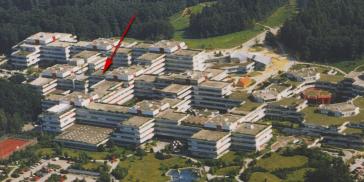 Finally, still as an undergraduate studying chemistry in Ulm, i started
working as a scientific helper, performing mathematical exercises and
computer courses for novice students. Later i 'moved up' to doing
exercises for undergraduate theoretical chemistry students, and during
my time as a PhD student i was hired as an instructor overseeing the
chemistry lab course and exercises for medical students.
Finally, still as an undergraduate studying chemistry in Ulm, i started
working as a scientific helper, performing mathematical exercises and
computer courses for novice students. Later i 'moved up' to doing
exercises for undergraduate theoretical chemistry students, and during
my time as a PhD student i was hired as an instructor overseeing the
chemistry lab course and exercises for medical students.
At the same time i got initiated to UNIX(tm) system administration, soon co-administrating the various AIX and IRIX workstations of the faculty, that were run by the department of theoretical chemistry. With the advent of the Intel Pentium cpu and due to the tight budget of the department, we figured, that running a bunch of PCs with Linux, would give a better value for the money, that regular workstations. Since linux distributions at that time (there weren't that many, and only Slackware has survived) had a lot of rough edges, and were quite a lot behind the (fast moving) cutting edge, i ended up replacing all precompiled binaries and scripts (including c-library, compilers and boot-up scripts) with hand-compiled, consistently configured versions that were optimized to our local needs. Some of the machines running the final version of that 'custom linux distribution' are still running very well (and you cannot run any current binary there, since they are still running on libc-5 and a 2.0 kernel).
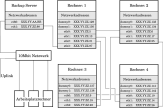 The high point of that time was the assembly of our own
little parallel (beowulf) computer. At that time (1997) large parts of the
university network were still running on 10Mbit (BNC cable) ethernet
and 100Mbit switches were extremely expensive. So we sat down and
figured, that we would get a similar (if not better) performance,
if we used a lot of 100Mbit ethernet cards and connected them
with crossover twisted pair cables in a hypercube topology.
Sorting out the routing tables was weird kind of fun (took me a few days),
but finally we had a setup (click on the image to see a larger scale
version) where we could even control the assignment of individual
parallel tasks to certain cpus via IP numbers. As it turns out, my
involvment in system administrator activities and intimate knowledge of
the inner workings of a linux system, proved to be a perfect preparation
for my current job.
The high point of that time was the assembly of our own
little parallel (beowulf) computer. At that time (1997) large parts of the
university network were still running on 10Mbit (BNC cable) ethernet
and 100Mbit switches were extremely expensive. So we sat down and
figured, that we would get a similar (if not better) performance,
if we used a lot of 100Mbit ethernet cards and connected them
with crossover twisted pair cables in a hypercube topology.
Sorting out the routing tables was weird kind of fun (took me a few days),
but finally we had a setup (click on the image to see a larger scale
version) where we could even control the assignment of individual
parallel tasks to certain cpus via IP numbers. As it turns out, my
involvment in system administrator activities and intimate knowledge of
the inner workings of a linux system, proved to be a perfect preparation
for my current job.
Altogether i would say, the common elements of my professional career,
so far, are the pleasure i draw from teaching practical courses and my
affinity to technology and computers in particular, both bridged by a
deep urge to figure out complex interactions and get to the root of a
problem. Working at a university in the field of computer simulations
of chemical problems (i.e. theoretical chemistry) seems to provide all
that (at the price of having to deal with a rather sluggish
administration and not much money in your pocket).
Other Interests
Computer Hardware and Programming
 My first concious encounter with something resembling a computer was
around 1979 when my physics teacher loaned me his programmable
Texas Instruments Ti51-III scientific calculator.
Due to its severe memory limitations (50 keypresses) i soon had to
learn, how to optimize 'programs' by doing the same work with less
keypresses. A few years later i got my first own programmable
calculator, a Sharp EL-5100.
My first concious encounter with something resembling a computer was
around 1979 when my physics teacher loaned me his programmable
Texas Instruments Ti51-III scientific calculator.
Due to its severe memory limitations (50 keypresses) i soon had to
learn, how to optimize 'programs' by doing the same work with less
keypresses. A few years later i got my first own programmable
calculator, a Sharp EL-5100. A very unique calculator, since it had an alphanumeric dot-matrix LCD
display for 80 characters. Also you could type mathematical expressions
like you wrote them on paper and it would only execute it, when you hit
the '=' key. In case of an error you could even recall the full
expression and correct it. On top of that it could store custom
expressions with an argument to be executed like the regular
preprogrammed functions. It also had a statistics mode, where you could
calculate averages, standard deviations and even linear regressions.
A very unique calculator, since it had an alphanumeric dot-matrix LCD
display for 80 characters. Also you could type mathematical expressions
like you wrote them on paper and it would only execute it, when you hit
the '=' key. In case of an error you could even recall the full
expression and correct it. On top of that it could store custom
expressions with an argument to be executed like the regular
preprogrammed functions. It also had a statistics mode, where you could
calculate averages, standard deviations and even linear regressions.
 After the EL-5100 ceased to function, i owned a
Casio FX-602P.
This one could be connected to an audio tape recorder where you could
save your programs to cassette tapes (sounded quite like a modem). It
had a very flexible and memory efficient programming language where you
could even program little games. It also could be programmed to play
little tunes. If you are interested in the history of (programmable)
calculatior there are some terrific resources with lots of images and
descriptions on the web, e.g. http://www.rskey.org/,
http://ernst.mulder.com/calculators/,
or http://www.calculators.de/. If you want to find
out what kind of chip is driving your calculator, try
http://forensics.calcinfo.com/.
After the EL-5100 ceased to function, i owned a
Casio FX-602P.
This one could be connected to an audio tape recorder where you could
save your programs to cassette tapes (sounded quite like a modem). It
had a very flexible and memory efficient programming language where you
could even program little games. It also could be programmed to play
little tunes. If you are interested in the history of (programmable)
calculatior there are some terrific resources with lots of images and
descriptions on the web, e.g. http://www.rskey.org/,
http://ernst.mulder.com/calculators/,
or http://www.calculators.de/. If you want to find
out what kind of chip is driving your calculator, try
http://forensics.calcinfo.com/.
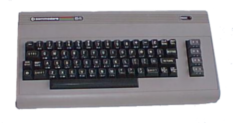 The final switch to real computers happened, when my brother agreed to
share his
Commodore C64 with me. A computer which was loved and hated at the
same time. Although it had a very efficient CPU (~1MHz), high quality sound
and graphics (compared to
other machines of that time),
but most of those features were ony partially available (via PEEK/POKE)
from the standard BASIC interface, which was horribly slow to boot
(heavy C64 users will still remember the dreaded 'Garbage Collection'
that could freeze the machine for hours). On
top of that, about half of the 64kB RAM was not available in BASIC
mode. But if you learned a bit of assembly programming, suddenly the
clumsy box turned into a very capable computer, and soon enough people
were programming lots of little helper programs that overcame many of
the limitations. The had a very strong following and spirit of C64 still
lives (although mainly in
emulators), see e.g.
http://www.c64.com/ or http://www.c64.org/.
The final switch to real computers happened, when my brother agreed to
share his
Commodore C64 with me. A computer which was loved and hated at the
same time. Although it had a very efficient CPU (~1MHz), high quality sound
and graphics (compared to
other machines of that time),
but most of those features were ony partially available (via PEEK/POKE)
from the standard BASIC interface, which was horribly slow to boot
(heavy C64 users will still remember the dreaded 'Garbage Collection'
that could freeze the machine for hours). On
top of that, about half of the 64kB RAM was not available in BASIC
mode. But if you learned a bit of assembly programming, suddenly the
clumsy box turned into a very capable computer, and soon enough people
were programming lots of little helper programs that overcame many of
the limitations. The had a very strong following and spirit of C64 still
lives (although mainly in
emulators), see e.g.
http://www.c64.com/ or http://www.c64.org/.
 Although i now own and use a pretty up-to-date x86-compatible personal
computer my fascination for classic computer hardware continues
through my obsession for the classic so-called
'IBM model M' keyboard.
Truely one of the best keyboards every made. Built to survive a nuclear
war and equally well suited for heavy typing and close combat. I
currently own three of them, and one of them has been in heavy use as my
workplace keyboard now for over 9 years (vintage 1991, so already 3
years old, when i started using it) without showing signs of use. You
supposedly can still buy them at http://www.pckeyboard.com/
But using an original, more than ten years old piece of computer
equipment, that has not lost any of its usability during its existence,
has a special kick. And i found, that i am
not alone with this obsession.
There even seems to be some hope to
extend its live into the age
of 'legacy free' computing.
Although i now own and use a pretty up-to-date x86-compatible personal
computer my fascination for classic computer hardware continues
through my obsession for the classic so-called
'IBM model M' keyboard.
Truely one of the best keyboards every made. Built to survive a nuclear
war and equally well suited for heavy typing and close combat. I
currently own three of them, and one of them has been in heavy use as my
workplace keyboard now for over 9 years (vintage 1991, so already 3
years old, when i started using it) without showing signs of use. You
supposedly can still buy them at http://www.pckeyboard.com/
But using an original, more than ten years old piece of computer
equipment, that has not lost any of its usability during its existence,
has a special kick. And i found, that i am
not alone with this obsession.
There even seems to be some hope to
extend its live into the age
of 'legacy free' computing.

 I occasionally play computer games, but the current batch of
shoot-em-all-up-3d games does not interest me much.
I rather prefer
games where the graphics don't matter that much, because they have
a real story, e.g. the classic
LucasArts Games:
I occasionally play computer games, but the current batch of
shoot-em-all-up-3d games does not interest me much.
I rather prefer
games where the graphics don't matter that much, because they have
a real story, e.g. the classic
LucasArts Games:
 'Zak McCracken',
'The Secret of Monkey Island',
'Monkey Island 2: LeChuck's Revenge',
'Day of the Tentacle',
'Sam and Max Hit the Road',
and 'Grim Fandango'.
I used to replay them once in a while until they became incompatible
with my current hardware. Thanks to the people at
http://www.scummvm.org/ i can now replay them again.
'Zak McCracken',
'The Secret of Monkey Island',
'Monkey Island 2: LeChuck's Revenge',
'Day of the Tentacle',
'Sam and Max Hit the Road',
and 'Grim Fandango'.
I used to replay them once in a while until they became incompatible
with my current hardware. Thanks to the people at
http://www.scummvm.org/ i can now replay them again.Music

Disclaimer / Author of this page: Axel.Kohlmeyer@theochem.ruhr-uni-bochum.de
Source File: whoami.wml (Mon Oct 10 00:05:35 2005) ($Revision: 1.18 $) Translated to HTML: Mon Oct 10 00:07:31 2005